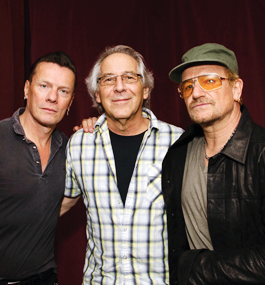Revolution on the Airwaves

Courtesy Norm Winer
Norm Winer ’69 (center) with U2’s Larry Mullen Jr. and Bono
In 1997, the Chicago Tribune honored what it called the “Chicago 100,” the most notable contributors to the city’s arts traditions. Listed alphabetically between Muddy Waters and Frank Lloyd Wright was Norm Winer ’69, program director at WXRT, the Chicago FM station that was “for decades the last bastion of free-form commercial rock radio in the country,” the paper declared. July 4, 1997, was proclaimed Norm Winer Day by the city’s mayor, Richard M. Daley.
Nearly two decades later, in 2015, Winer received Chicago’s Fifth Star Award, which celebrates the city’s creative elite, inspiring Bono to issue this tribute: “If it weren’t for Norm Winer, there would be no U2.” Lyle Lovett, Steve Earle and Billy Corgan sent in their congratulations via video.
Winer, who joined WXRT in 1979, worked there 37 years. After the station was bought by CBS, Winer added the title “vice president of rock” to his program director duties, overseeing radio stations nationwide. His focus: ensuring each one stayed true to its roots. “I wanted the Atlanta station to sound like Atlanta,” he says. “Local flavor is what makes a media outlet great.”
Today Winer, who left WXRT in 2016, is launching Noteworthy, a curated streaming digital entertainment network. “You have to respect the audience and understand they’re smarter than us,” he says. “The people running broadcasting too often underestimate the public’s intelligence.”
Winer’s passion for radio took off at Brandeis, when the Brooklyn native signed up to work at WBRS his first day on campus and spent four years as a DJ. His music program “Out of the Norm” began at midnight and ran until “whenever I felt like turning off the station,” he says.
In 1969, the 21-year-old joined fledging Boston FM station WBCN as a weekend DJ and shortly thereafter became its news director. “I convinced them that since I read The New York Times every day, I was eminently qualified for the role,” he says.
Winer helped WBCN become a prominent voice in the cultural revolution, scoring frequent interviews with Abbie Hoffman ’59 and getting a student’s eyewitness account of the Kent State shootings just hours after the incident happened. When WBCN covered Boston-area protests, “my news reports were often delayed because I was participating” in them, he remembers.
After leaving for a short stint at a Montreal radio station, Winer returned to WBCN to become program director. He might have been the boss, but you weren’t likely to find him in a suit and tie. And he still maintained an on-air presence, calling himself “Ol’ Saxophone Joe” (a name he got from a Bob Dylan song), and introducing listeners to reggae and Monty Python.
In 1977, Winer went west to San Francisco underground station KSAN, where he worked for two years before heading to Chicago and national fame at WXRT.
This year, he’ll be returning to campus to attend Alumni Weekend, at which he’ll host a wide-ranging discussion. “Reconnecting with my classmates encourages me to not stop challenging and questioning everything,” he says. “I look forward to seeing all those geniuses, troublemakers and hopeless idealists, and thinking of how we can continue to stir things up. There’s still a lot of twinkle in our eyes.”
— Brian Klotz
